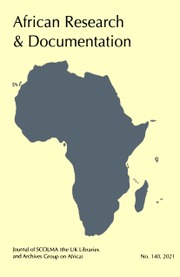Article contents
Accessing African Archives, Libraries & Journals: Partnerships, Ethics & Equity in the 21st Century
Published online by Cambridge University Press: 25 April 2022
Abstract
In terms of African scholarly resources, the new millennium has begun much as the last ended. Book and journal famines, limited Internet connectivity outside capital cities, and continuing brain and document drains that sap the resources and morale of African scholars and libraries. Co-operation among Africana librarians and between scholars and information workers thus has never been more urgent. The author reports on several important new projects focusing on electronic scholarly communication, publishing, and information resources, including the African e-Journals Project, African Journals Online, and the African Online Digital Library. He also draws attention to the contradictions and ethical issues apparent in some Western collecting practices, for instance the deployment of Western financial muscle to acquire African collections.
- Type
- Articles
- Information
- Copyright
- Copyright © International African Institute 2002
References
- 4
- Cited by




